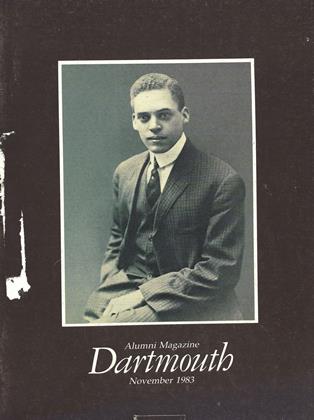Beginning,in the fall of 1984, all incoming freshmen will be offered an opportunity to purchase a personal computer through the College on "attractive" terms. The plan will place Dartmouth, an innovator in time-share computing in the sixties, "clearly in the lead, along with a small number of other institutions," of contemporary computing's emphasis on personal computers, according to Provost Agnar Pytte. He envisions that within four years, "everyone on campus who wants one will have one."
The plan was developed by the Council on Computing and endorsed by the trustees. Freshmen electing it will pay an estimated $l30 per term for 12 terms to cover the purchase price, financing costs, and a maintenance contract during the purchase period. The computer would be the student's personal property after 12 terms. The same package will also be available to upperclass students, and the personal computers, or PCs, will be installed in several public clusters for students not electing the purchase option.
Still to be decided is what model PC will be chosen. The College is negotiating with Apple, IBM, and Digital, but all the machines being considered are "very powerful little things," notes Pytte, "as powerful as the mainframe at Kiewit in the sixties."
One of the great benefits of the proposal, Pytte explains, is that Dartmouth will not be sacrificing its position in the time-share field while taking advantage of the revolution in personal computers. All dorm rooms will be hardwired for access to the Kiewit system by next fall, and installation of communication ports in fraternities and sororities is expected to be accomplished within the academic year. (Most academic and administrative buildings are already hardwired.) This will mean that students can tap directly into the whole Kiewit system from their rooms, but that "if Kiewit is saturated or goes down, students can keep writing their papers," explains Pytte.
He estimates that between 80 and 90 percent of next fall's freshmen will get a computer and notes that the fee will be part of the financial aid package so "it won't be only the rich kids" who can take advantage of the offer. He thinks that ""perhaps 25 percent of the upper class students will get one right away" and that it won't be long before "everyone who wants one will have one on his or her desk."
The advance of legions of PCs across the campus is being challenged, however, by some faculty members. The proposal has been presented at two faculty meetings, where concerns were raised over the degree of faculty input into the decision and oyer the lack of time to integrate the computer fully into courses. Pytte notes, though, that the estimated 40 percent of the faculty familiar with computer use, while considerably lower than the 95 percent of students in that category, is nevertheless "well ahead of other schools."
"We are not attempting at all to force faculty members who don't, see a use for the computer to use it in their teaching," explains Pytte, "but it will be made widely available to the faculty and many will see great opportunities in it." Grants will be sought to provide academic departments with terminals well ahead of next fall, and faculty members will also have the option of purchasing one for personal use under the same plan offered to students.
In sum, Pytte calls the new plan "a great step forward."
Drama Professor Emeritus Henry Williams, left, was feted at a gathering markingthe naming of the College's theatre collection in his honor, an occasion attended bymany well-wishers, among them Buck Henry '52, right.
 View Full Issue
View Full Issue
More From This Issue
-
 Feature
Feature"The Greatest Problem in American Biology
November 1983 -
 Feature
FeatureGiving the Rush to the Record books
November 1983 By Brad Hills '65 -
 Feature
FeatureJohn Singer Sargent: Last of the Great Portrait Painters
November 1983 By Richard Stuart Teitz -
 Sports
SportsSports
November 1983 By Kathy Slattery -
 Books
BooksAll Biology Is Indebted . . .
November 1983 By Peter Smith -
 Class Notes
Class Notes1979
November 1983 By Burr Gray








